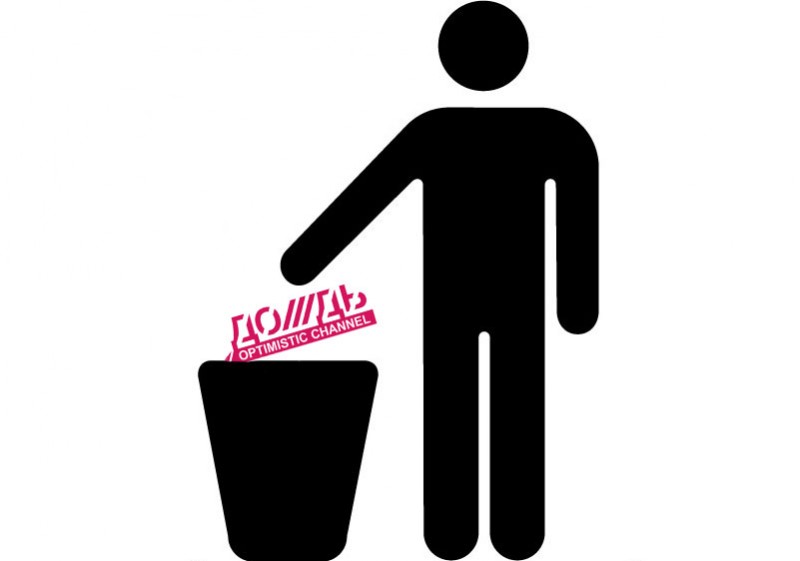
Could TV Rain end up in the trash bin of history? Images mixed by Kevin Rothrock.
The only opposition television station operating today in Russia is now threatened with losing access to cable broadcasting. A product of the brief political thaw under President Dmitri Medvedev, TV Rain, or “Dozhd” in Russian, has been on air since April 2010. The station is accessible online (for a fee), by satellite, and via cable television. It is this last option that might go the way of the dinosaurs very soon.
The tentative reason for ending TV Rain’s cable television dissemination is a supposedly unpatriotic poll the channel aired on January 27, 2014, asking readers to assess Soviet military tactics during the Siege of Leningrad in World War II. The question that caused the uproar was, “Should Leningrad have been surrendered [to the Nazis] to spare hundreds of thousands of lives?” (The station later canceled the poll and apologized [ru] for the question.)
A day later, Yuri Pripachkin, President of the Cable Television Association of Russia (AKTR), said publicly [ru] what many interpreted to mean eliminating the cable broadcasting of TV Rain in Russia. Pripachkin later clarified [ru] his remarks, explaining that AKTR is not considering a requirement that cable operators drop TV Rain from coverage, but acknowledged that the organization is debating whether to allow operators to make that decision for themselves “based on financial considerations.”
Pripachkin’s argument is that TV Rain, offered as part of a package of many television channels, frequently offends viewers with provocative content, causing cable operators potential losses, when consumers supposedly leave in disgust. Another grievance from AKTR is that TV Rain’s regular promotion of its online stream—available for about $90 a year—also bleeds cable operators of money and clients. (At the time of this writing, AKTR’s website was disabled by what appeared to be a DDoS attack.)
The response to this scandal from TV Rain’s supporters has been tenacious. While most admit the wording of the Leningrad blockade poll was unfortunate, many of the television station’s fans insist that the subject should remain open to debate. The threat to Russia’s only opposition TV station has of course galvanized the country’s most active group of bloggers: Russian journalists.
Andrei Arkhangelsky argued [ru] in a Facebook post that the World War II question, whatever its tone, performed a service to society by drawing out expert opinions about the siege. Rustem Adagamov, a Russian photo-blogger living in self-exile in Prague, came to similar conclusions [ru], pointing out that TV Rain never expressed any approval for the idea of surrendering the city to the Germans. In a somewhat different vein, television personality and director Andrei Maksimov wrote [ru] on Facebook that Russians should expect nothing else from young people, given the “castration” of modern education, severing today’s generation from the past’s values of the Great Patriotic War.
GQ Russia magazine’s Michael Idov posted [ru] to Facebook one of the most interesting, if not peculiar, reflections on the possible crackdown against TV Rain. Trying to demonstrate the power imbalance weighing on the station, Idov asked readers to consider, what he says is, “the only justification for the behavior of the state of Israel”—a mental exercise, whereby you imagine the situation “inside-out.” In the case of Israel, this means seeing a world where Israel is a small, lone Muslim state, surrounded by Jewish countries. In order to understand TV Rain, Idov recommends imagining a lone, tiny television station dedicated to pro-regime hardliners, surrounded in a sea of liberal media giants. (This might mark the first time in history when someone appealed to the Israel-Palestine conflict as a more coherent antagonism.) Idov contends that TV Rain, despite mistakes along the way, has come to be a media powerhouse worthy of respect.
The TV channel hasn’t won over all the netizens, of course. Kirill Shulika, an often-shrewd activist in Russia’s Democratic Choice party, observed [ru] on Facebook that TV Rain’s managers must have anticipated a reaction like Pripachkin’s. Shulika suggests that the television station might have engineered the scandal in order to whip up publicity, or possibly to rid itself of its cable TV contracts, which he speculates have been less than profitable.
As fate would have it, TV Rain’s World War II history faux pas wasn’t Russia’s only in the last 48 hours. The Kremlin-friendly television station Russia-24 experienced its own, far more entertaining screw up [ru], when the channel’s social media marketing staff included a photograph and quote from Nazi ideologue Joseph Goebbels praising Vladimir Lenin. The quote, “Lenin was the greatest among the Russians,” was part of a collage of famous remarks about Lenin for the 90th anniversary of his death.
Russia-24 quickly fired [ru] the entire editorial staff of its social media marketing team. At this time, no one with any authority [ru] in Russia has proposed sanctions against the station for propagating the visage of the Third Reich’s most zealous advocate. On the other hand, Roskomnadzor, the Russian government’s media watchdog agency, has announced [ru] that it has received complaints and will open an investigation into TV Rain’s poll about the siege of Leningrad.








9 comments
This channel is available – for free – from the Astra 4A satellite (position 4.8 E) throughout Europe